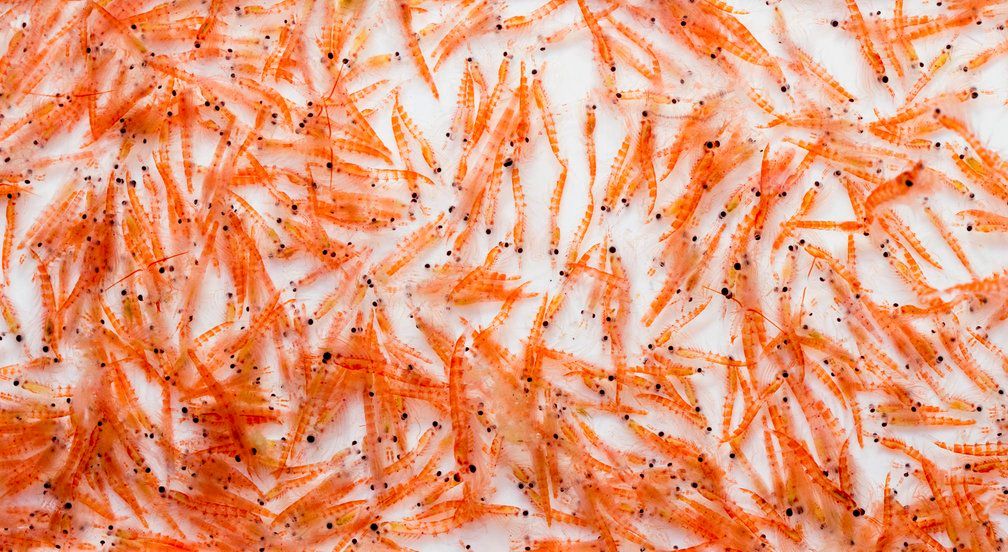Aker’s New Krill Oil Technology Improves Odor, Taste, and Nutritional Profile
Flexitech not only improves krill oil’s taste and odor but also allows Aker BioMarine to increase concentrations of krill’s health-promoting constituents.
Photo © iStockphoto.com/Tenedos

Aker BioMarine (Oslo, Norway) has big plans to take its Superba krill oil to new heights. At Natural Products Expo West, the company unveiled new technology that not only improves krill oil’s taste and odor but also allows the company to increase concentrations of krill’s health-promoting constituents, such as phospholipids and omega-3 fatty acids EPA and DHA.
Aker’s new Flexitech technology removes trimethylamine N-oxide (TMAO), a salt, from the oil. TMAO converts to trimethylamine (TMA), an organic compound largely responsible for seafood’s “fishy” odor. By removing this salt, Aker says it improved the taste and odor of its krill oils, leading the company to introduce the next generation of its flagship Superba oil, called Superba 2.
Becky Wright, Aker’s marketing director, says Aker will continue offering its original Superba formula but expects the market to largely shift to Superba 2. “Eventually, everybody is going to be Superba 2,” she says.
More significantly, Flexitech gives the Aker the ability to enhance the properties of its krill oil. Flexitech enables the company to “up-concentrate” its oils to boost levels of phospholipids and omega-3 fatty acids as well as krill’s other nutrients like choline and astaxanthin. For instance, Aker says, it could increase phospholipids percentage by up to 50%, EPA and DHA bound to phospholipids by up to 40%, total EPA and DHA levels by up to 20%-30%, and choline levels by up to 40%.
“The next logical step for us is a krill concentrate, and that’s coming out shortly,” Wright adds. She also points to the possibility of combining krill oil with other types of ingredients in formulation, thanks to Flexitech.
“That’s how powerful this technology is. It really allows us to be very flexible in what we can do and explore a lot of different avenues that we couldn’t previously,” she continues. “Everything hinges on this new technology. Superba 2 is really the first of many new things that will be birthed from this.”
In addition, Flexitech offers encapsulation and handling benefits during line production. Typically, krill oil is very viscous, Wright says, but with Superba 2, “the viscosity, the thickness, has gone down. It’s a lot thinner. It might even be a little thinner than fish oil at this point.” The company estimates a level of reduced viscosity between 50%-70% compared to the original oil. Whereas more viscous oils could challenge encapsulating machines, Wright says that “this is a more seamless oil that runs through” smoothly. “It’s just a much easier oil to work with,” she says.
Ease of handling may eventually enable krill oil to expand to other delivery vehicles like food and beverages, Wright adds. “The obvious goal is to be able to formulate into different applications beyond soft gels,” she says, adding that the goal is to “go wherever omega-3s can go.”
For consumers, the new oil, Superba 2, is also a brighter, more visually pleasing shade of red than the previous maroon version. But, most importantly, Wright says, what consumers are likely to appreciate most is the decreased odor. “I think what’s going to be most appealing is the fact that it doesn’t smell anymore,” she says.
Wright points out that Flexitech does not use a chemical process to remove salts or boost nutrient properties. “This is a low-temperature process in which you’re mechanically, physically, removing things from the oil that can cause negative effects,” Wright says. She juxtaposes this to processes that fish oil extractors can use, such as molecular distillation, that employ heat to remove heavy metals and other toxins. “Flexitech relies solely on low temperature and efficient fractionation methods, which remove unwanted salts and other polar constituents,” the company says.
Aker is now handling oil extraction and production at its new 180,000-sq-ft NSF GMP-certified plant in Houston, TX, which is now operating commercially and is, the company claims, “triple the size of the next largest krill oil supplier.” With this company-owned plant, the firm now owns its entire supply chain and can claim that it’s products are “Made in the USA.”
“We own our vessels, we fish for the oil, we produce the meal and process onboard, and then we ship it to Houston, where they extract the oil,” Wright says. “We’re there at every step of the supply chain, which I think is really an advantage because a lot of people want to know you have oversight of what’s going on, from catch to capsule.”
Also read:
Krill-Based Research Initiatives Will Strengthen Industry Sustainability
New Breakthroughs in Omega-3 Research
Jennifer Grebow
Editor-in-Chief
Nutritional Outlook magazine
jennifer.grebow@ubm.com



